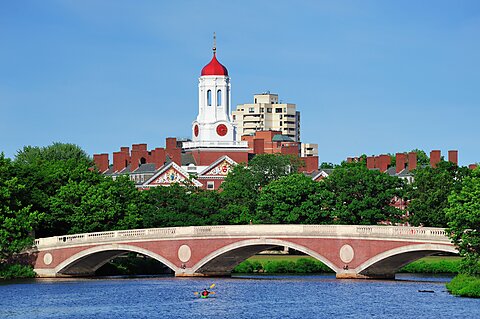Neal McCluskey
The Trump administration has been sending a mixed message on education: it’s not a federal job, but the administration will use federal funding to bend schools to its will. Those are contradictory positions, and one was likely to predominate. So far, it seems it has been the latter, but yesterday, a federal district court helped bolster a big obstacle to control—Harvard University—finding that the administration’s ongoing assault on the ancient institution is illegal.
With the putative aim of stopping antisemitism at Harvard, the Trump administration froze and eventually terminated $2.2 billion in research grants going to the university. That was accompanied by bounteous bluster about how terrible Harvard is on all sorts of measures, including from the president himself.
What the court found is that while antisemitism existed at Harvard, the administration’s invocation of it seemed much more like a pretext to assault the university rather than a real target. The following list of observations about the administration’s accusations is repeated several times in the ruling. The administration, in deciding to freeze and then terminate research funding at Harvard, failed to:
1) acknowledge the reforms and commitments Harvard had already made [on antisemitism], including commissioning the Harvard Task Force…. 2) identify any specific instances of antisemitism on Harvard’s campus, or 3) specify how Harvard failed to respond to any such acts of antisemitism in a way that violated Title VI.
The ruling also cites rhetoric by Trump celebrating the funding freezes that had nothing to do with antisemitism, including Harvard’s “hiring almost all woke, Radical Left, idiots and ‘birdbrains’ who are only capable of teaching FAILURE to students.” He specifically called out the hiring of former New York City Mayor Bill de Blasio and Chicago Mayor Lori Lightfoot. The ruling also notes that of ten terms the administration demanded Harvard agree to, only one was specifically about antisemitism—“Reforming Programs with Egregious Records of Antisemitism or Other Bias”—with the remainder about changing university governance, hiring practices, fostering viewpoint diversity, and more.
The ruling also observes that the administration did nothing to try to protect Jewish researchers, or Jewish people more broadly, in its actions, stating that research:
was frozen without any sort of investigation into whether particular labs were engaging in antisemitic behavior, were employing Jews, were run by Jewish scientists, or were investigating issues or diseases particularly pertinent to Jews (such as, for example, Tay-Sachs disease), meaning that the funding freezes could and likely will harm the very people Defendants professed to be protecting.
Ultimately, the ruling was grounded in fundamental liberty: government cannot condition receipt of funds on recipients adopting government-approved speech or ideas or punish disapproved ideas. Thankfully, the Trump administration did a lot to demonstrate that its actions were about much more than combating antisemitism, leaving little question that this was a major, dangerous overreach.
Alas, this is not the end of the story. The Trump administration said it will “immediately move to appeal” the decision. And the process is, to a large extent, the punishment, costing Harvard lots of time and money fighting in court and keeping the status of research uncertain. That is likely why Columbia, Brown, and the University of Pennsylvania settled with the administration. But if Harvard can keep fighting and winning, it will ultimately be to all institutions’—and free society’s—benefit.
Of course, none of this is to say that the federal government should be spending what it does on research. But that is a different issue from what Trump is trying to coerce with the money.

